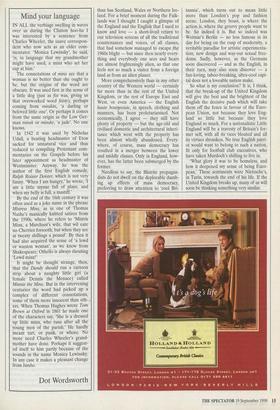Mind your language
IN ALL the verbiage swelling in waves over us during the Clinton hoo-ha I was interested by a sentence from Charles Wheeler, the suave correspon- dent who now acts as an elder com- mentator. 'Monica Lewinsky', he said, `is, in language that my grandmother might have used, a minx who set her cap at him.'
The connotations of minx are that a woman is no better than she ought to be, but the origins of the word are obscure. It was used first in the sense of a little dog (just as fist was, giving us that overworked word feisty), perhaps coming from minikin, 'a darling or beloved little one'. Or perhaps it comes from the same origin as the Low Ger- man minsk or minske, 'a jade'. No one knows.
In 1542 it was used by Nicholas Udall, a beating headmaster of Eton sacked for unnatural vice and thus reduced to compiling Protestant com- mentaries on the Gospels before his later appointment as headmaster of Westminster. Anyway, he was the author of the first English comedy, Ralph Roister Doister, which is not very funny. 'When I am hungry,' he wrote, 'I am a little mynxe full of playe, and when my belly is full, a mastiff.' By the end of the 16th century it was often used as a joke name in the phrase Mistress Minx, as in one of Thomas Nashe's manically knitted satires from the 1590s, where he refers to `Mistris Minx, a Marchant's wife, that wil eate no Cherries forsooth, but when they are at twenty shillings a pound'. By then it had also acquired the sense of 'a lewd or wanton woman', as we know from Shakespeare; Othello is always shouting `Lewd minx!'
It might be thought strange, then, that the Dandy should run a cartoon strip about a naughty little girl (a female Dennis the Menace) called Minnie the Minx. But in the intervening centuries the word had picked up a complex of different connotations, some of them more innocent than oth- ers. When Thomas Hughes wrote Tom Brown at Oxford in 1861 he made one of the characters say, 'She is a dressed up little minx, who runs after all the young men of the parish.' He hardly meant tart, or punk, or whore. No more need Charles Wheeler's grand- mother have done. Perhaps it suggest- ed itself to him partly because of the sounds in the name Monica Lewinsky. In any case it makes a pleasant change from bimbo.
Dot Wordsworth










































































 Previous page
Previous page